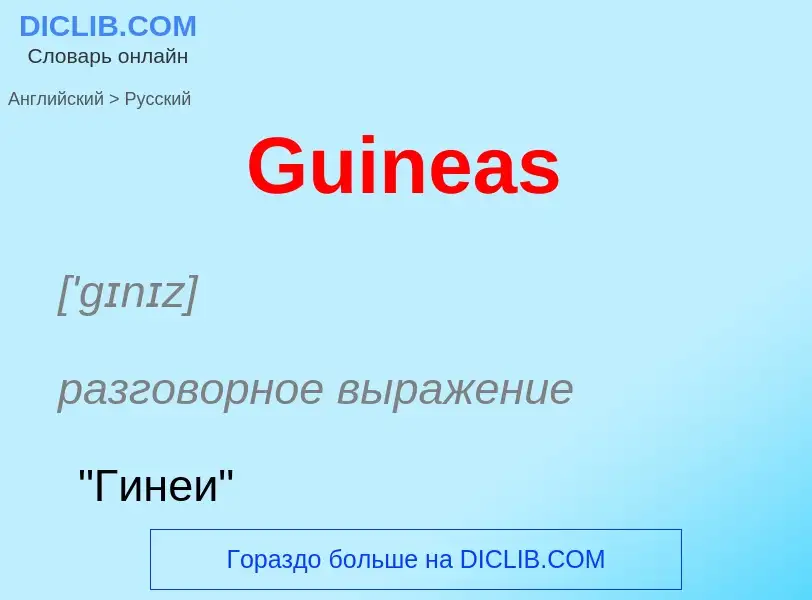Translation and analysis of words by ChatGPT artificial intelligence
On this page you can get a detailed analysis of a word or phrase, produced by the best artificial intelligence technology to date:
- how the word is used
- frequency of use
- it is used more often in oral or written speech
- word translation options
- usage examples (several phrases with translation)
- etymology
Guineas - translation to English
['gɪnɪz]
разговорное выражение
"Гинеи"
синоним
[,tu:,θauztnd'gɪnɪz]
общая лексика
"Две тысячи гиней" (ежегодные скачки для трёхлетних кобыл на ипподроме в г. Ньюмаркете, графство Суффолк)
синоним
Wikipedia

The guinea (; commonly abbreviated gn., or gns. in plural) was a coin, minted in Great Britain between 1663 and 1814, that contained approximately one-quarter of an ounce of gold. The name came from the Guinea region in West Africa, from where much of the gold used to make the coins was sourced. It was the first English machine-struck gold coin, originally representing a value of 20 shillings in sterling specie, equal to one pound, but rises in the price of gold relative to silver caused the value of the guinea to increase, at times to as high as thirty shillings. From 1717 to 1816, its value was officially fixed at twenty-one shillings.
In the Great Recoinage of 1816, the guinea was demonetised and the word "guinea" became a colloquial or specialised term. Although the coin itself no longer circulated, the term guinea survived as a unit of account in some fields. Notable usages included professional fees (medical, legal, etc.), which were often invoiced in guineas, and horse racing and greyhound racing, and the sale of rams. In each case a guinea meant an amount of one pound and one shilling (21 shillings, £1.05 in decimal notation).


![King James II]], with elephant and castle under the bust, 1686 King James II]], with elephant and castle under the bust, 1686](https://commons.wikimedia.org/wiki/Special:FilePath/1686-Guinea-elephant-and-castle-James-II.jpg?width=200)












![Engraving of the 1874 2,000 Guineas, from the ''[[Illustrated Sporting and Dramatic News]]'', May 1874 Engraving of the 1874 2,000 Guineas, from the ''[[Illustrated Sporting and Dramatic News]]'', May 1874](https://commons.wikimedia.org/wiki/Special:FilePath/Two Thousand Guineas, 1874.jpg?width=200)
